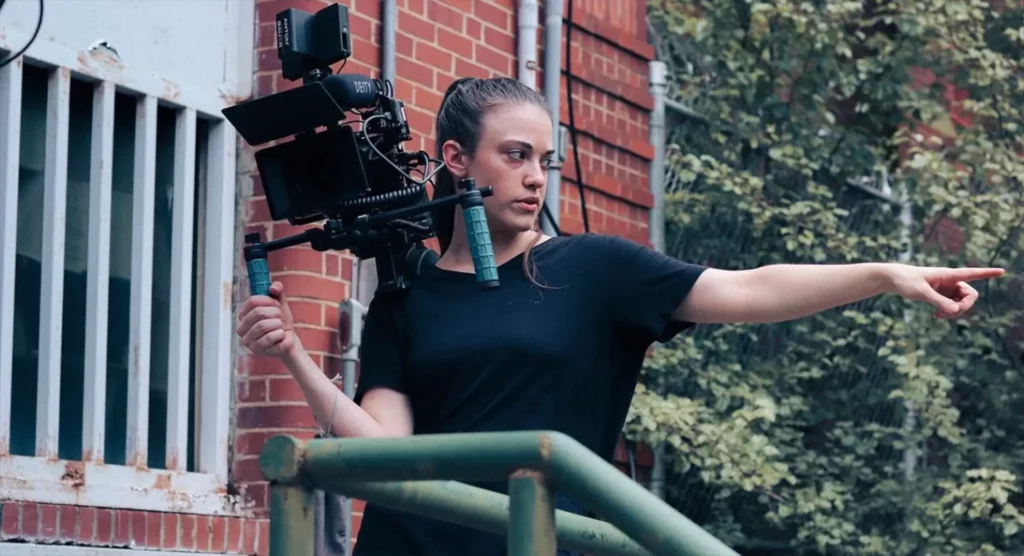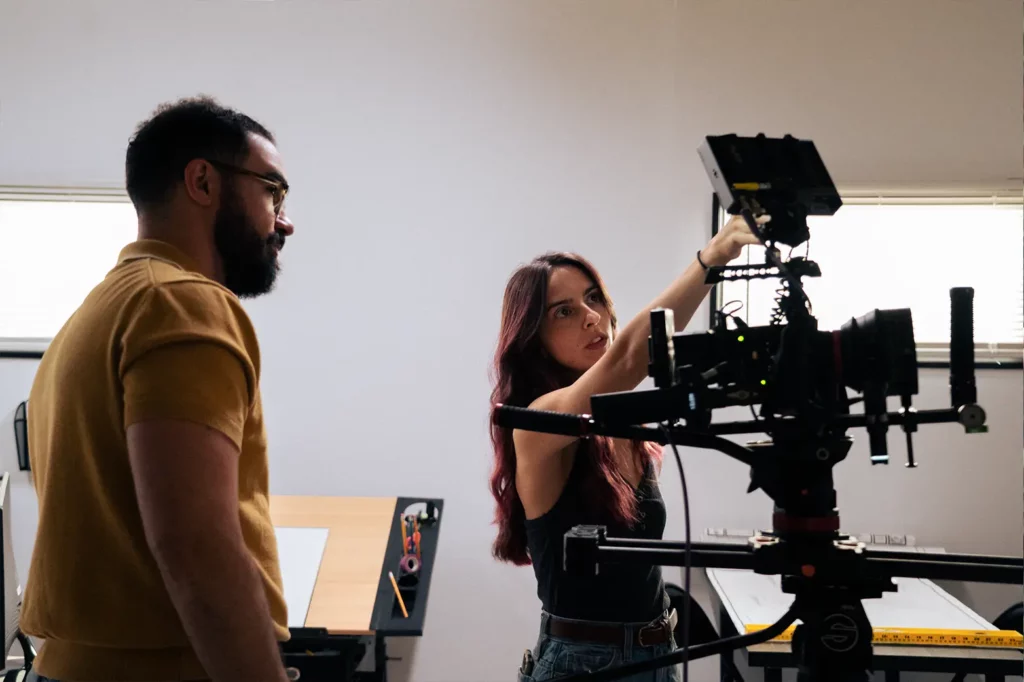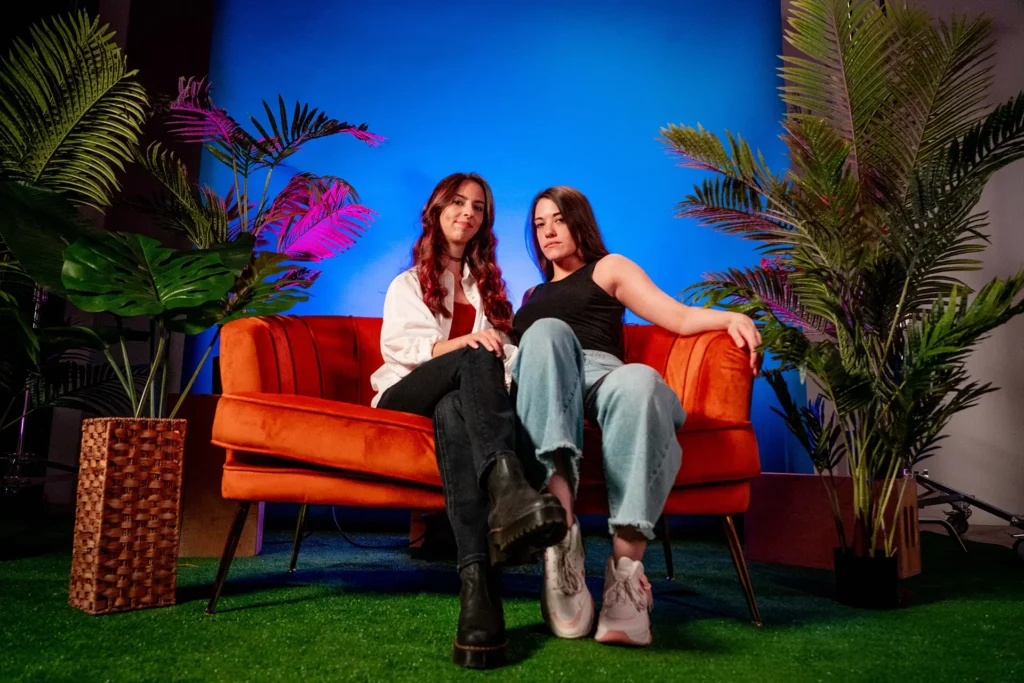We sat down with Emily Payton, Director of Post Production & DP, and Haley Fusia, DP and Editor, to talk all things women in camera. Emily and Haley chat about the women that they admire, their experiences, and offer advice to other women in this field. We go behind the lens to find two more talented women of ECG in a dynamic and honest conversation denoting their immense skills and their rapport on set.
Who are some women in film, or specifically women in camera that you admire?
Emily: Reed Morano is one that comes to mind. I like that she focuses on people. She’s got some stuff under her belt, but she’s relatively new. Also, Rachel Morrison..”
Haley: That’s exactly who I was thinking, Rachel Morrison.
Emily: I remember watching Black Panther, and it was Rachel Morrison’s camera work that showed the fighting styles through the cars and through the buildings. I mean, like, the way that the camera moves, I am a huge trick-shot movement/one-shot fan. She gave a lot of life to it. The Marvel movies didn’t have that same look until she got onboard, and I think Black Panther looks completely different from other Marvel movies because of the way she shot it.
Haley: I remember hearing her from Mudbound, because she was nominated for an Oscar, and how she shot that. It was, I don’t know, she’s just so badass and really cool.
Haley: I’m trying to think about other women I look up to in film, specifically in camera operation, and there aren’t that many on the larger scale. There’s definitely a lot in Indie film, In Indie filmmaking I see a lot of women.
Emily: Valentina.
Haley: Yes! Valentina V! She’s awesome!
Emily: She teaches too, and Aperture, which is a big brand, supports her.
Haley: And Adobe.
Emily: Yea, so that’s awesome that you see more people in power in that regard. And they’re teaching and they’re leading. She’s a great DP and director, but really where she excels is she’s fun, she wears this blue wig, and she makes everyone really excited about everything. She’s great! I love seeing leadership like that, especially in teaching, it paves the way.

Why do you think women are more present in Indie filmmaking rather than things that are more mainstream?
Haley: I just think Hollywood’s still a little behind. You see that in everything, like “Oscars so white,” and all of that. I think they’re behind, because it’s still mostly white men.
Haley: In school, the only sets I ever worked on were all women, we didn’t work with men except for one guy who’s part of the queer community. It was such an easy group to work with. We made a little group and so many of the guys in that class were so mad about it.
Emily: What was the experience that kicked off that group?
Haley: It was a small program and a few of us just gravitated towards each other. Even though it was a grad program some people were just there because their parents wanted them to be, or they thought they had nothing left to learn, and we didn’t want to work with them. Once we got into the group, it was just a different experience. We didn’t talk over each other, we communicated really well, we listened to each other.
Being that this field is predominantly male, how does it feel to see other women on set? What are some things that we should normalize for women in this field?
Haley: There’s a picture on our website or our Instagram of a woman who used to work here. She was a camera operator and she had nails and I was like “That’s awesome, like that’s so cool!” I feel like I’ve just recently seen us start to wear skirts and wear dresses, because I would never before.
Emily: I’m working on the working dress, I want to normalize it. I always feel like when I’m directing I try to dress like the spirit of the shoot. And when I’m cam-oping or doing something more physical, I try to be as versatile as I can. But yes, my cargo pants are fitted, they cinch at the waist, and they accentuate my butt–because they’re cute and they can be and that’s fine. It’s what I’m used to in style. You don’t have to come in like a Black-Ops operator, you know? You can show off your personality a little bit. It’s a different thing that the industry isn’t used to.
How do you think women’s perspectives shape the way that they film and/or tell a story?
Emily: I’m noticing there’s another eye that I’ve seen lately that shows some things, I don’t know. Like Game of Thrones: House of the Dragon has a couple of birthing scenes and they’re written by women, some of them are directed by women or shot by women. The way they put you in it, a lot of female DP’s and Directors, the shot feels visceral and more emotive. They get in there and get kind of gross with the shot, like if the situation is horrific, you’re in the horrific situation with her. She’s in the middle of a c-section in the middle ages and you feel like you’re in it with her.

Let’s talk about tech…what’s your favorite camera or your favorite shot?
Emily: So a lot of what I want to do is show what you haven’t seen. Show the different perspectives, show the beauty in the world that we have to protect kind of thing (not to get too heady). I had a project with the Angari Foundation, we’d worked with 360 footage before, but in the sense of there was a giant ball in the room, no one can move, and we had to stitch it together. This camera, the insta 360, was like the first line of commercial 360 cameras where you didn’t really have to do that.
We got a couple of them and got a project for a VR educational experience about the ocean, about sharks. Being able to work with scientists and being next to these animals, yelling “Hi babyyy!” to these bull sharks was everything. I was very blessed to have that experience. To learn a new camera, a new system, and be able to test yourself afterwards for an important cause; makes you feel like you’re doing it right.
Haley: My favorite camera is when we get a new one, or when you have to shoot on something new, and it’s like “alright, I’m going to figure this out real fast.” I think that’s just fun, because you’re using so much past experience and then you feel like”ah, yes, I do know what I’m doing.” I can apply it to this new camera that I’ve never touched before and get a good shot.
My favorite shots? I definitely like run-and-gun more, it’s less planned out and documentary style. You have an idea of what you need to get, but you just go and get it. I like being able to go outside and just get the shot and use natural light. I think that carries over from my photography and the fact that I love shooting people’s faces and hands. It’s the little intricacies.
Emily: And that style’s always fun. Like you’re at an event, you’re shooting someone’s hands and you rack focus to a plant, then rack focus back, like “This is such a good shot!”
Haley: Exactly!
Emily: Getting a new camera and working with a variety of different things, which is great that we get to do here. You know what camera you need for certain situations. Like, working with the RED is awesome, it’s a RED; it’s really fun to put together, it’s nice to hold, there are a lot of perks to the RED. But there’s also the Blackmagic Pocket Cinema. It’s one of the best cameras that you can always use to get what you need. It’s so good in low-light; it feels like a DSLR camera, but it’s so cinematic.
What advice do you wish you had or would you give to other women, especially young women, that want to work in camera?
Haley: The cheesiest thing, but I wish someone had told me this, is just don’t let anyone tell you that you can’t do it.
Emily: I know right, because you totally can.
Haley: I remember having a Camera professor in my grad program and I told him I wanted to do camera, and he was like “(side eye) okay.” He didn’t really think anything of it until I shot and showed him my work. He loved it and I became his favorite student. That was just like proving myself, but I wonder if he would have had the same reaction if I was a guy.
Haley: I feel like a lot of men can skate through being mediocre and women have to be exceptional.
Emily: *snaps*
Haley: And we are exceptional, so just do it!
